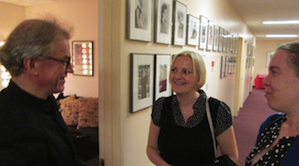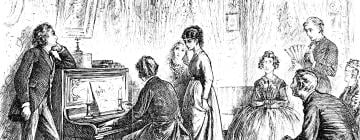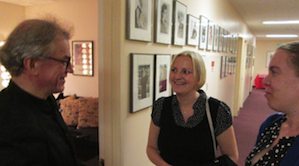
And even better: if you missed it (my sympathies), KDFC-FM will be kind enough to broadcast it at 8 p.m., next Tuesday, Feb. 11. If you're in the Bay Area, that's on radio, if you're not, listen on the internet.
The program conducted by Osmo Vänskä: Sibelius' Night Ride and Sunrise, Rachmaninov's Rhapsody on a Theme of Paganini (Daniil Trifonov), Stravinsky's Symphonies of Wind Instruments, and Sibelius' Symphony No. 6.
It's very rare to hear a concert where everything clicks. While Trifonov was at his awesome best (unlike his previous appearances here), it was Vänskä and — under his direction — the SFS orchestra that made this a thoroughly special, memorable event.
For me, at least, after a lifetime of listening to the Sibelius Sixth Symphony, it was Vänskä's performance of it — clear, transparent, passionate, and his total immersion — that made me hear it for the first time. As I was talking about it long after the performance, a friend suggested that I might have had a "religious experience." A peak experience, certainly.
These are some of the other impressions of these concerts:
Robert Commanday in Classical Voice North America:
... After a startling smash in the winds, Night Ride and Sunrise goes into the long-string Sibelian gallop on slow-changing harmonies, the familiar tread sounding like a distant inspiration for Philip Glass and John Adams. But then it turns to shifting colors and textures and wonderful contrasts of mood. The Sixth Symphony, this concert’s finale, may be his most original work — in form, in mysterious turns (surprising closing measures), in the unexpected atmospheres, the course of each movement, the richness of ideas, and the step-back endings of the first and last movements ...

Photo by Janos Gereben
Joshua Kosman in The San Francisco Chronicle:
... for the most part Sibelius creates unique musical dramas out of harmony and orchestral texture — and they respond best to conductors who are particularly attuned to his way of thinking.One such interpreter is Osmo Vänskä, the Finnish conductor who led the San Francisco Symphony in a wonderfully dynamic and cogent account of Sibelius' Sixth Symphony in Davies Symphony Hall on Thursday afternoon.
... the Sixth Symphony, coming at the end of the program, elicited the finest work from both Vänskä and the orchestra. This is the strangest and least known of the composer's seven symphonies (those facts are not remotely unrelated), and Vänskä guided the audience through its mysteries without minimizing its quirky beauty.
Part of that involved a careful cultivation of Sibelius' orchestral sonorities — the eerily high-floating string music that begins the symphony, or the robust, finely blended chords of the finale. Rhythmic responsiveness came into play as well, in a piece whose four movements only rarely edge toward a slow tempo.
Stephen Smoliar in Examiner.com:
...The movements end in silence, rather than through the resolution of a strongly-stated harmonic progression. All of this can be a bit disorienting to those with strong preferences for the eighteenth and nineteenth centuries, but Vänskä guided the attentive listener through the ambiguities of Sibelius’ transitions across episodes with a sure hand. This is music that fashioned its own logic, as Stravinsky would do later in his wind "symphonies"; and Vänskä’s account of Sibelius’ approach was compelling enough to allow us always to trust the composer’s judgment.This was a performance with absolutely no false steps, which may yet be the most memorable event of the current SFS season.
In response to several questions: Trifonov's encores were Bach's Gavotte from Partita No. 3 in E major for solo violin, BWV 1006 (trans. Rachmaninov) on Friday, and Stravinsky's "Danse Infernale" from The Firebird (trans. Guido Agosti) on Saturday.

